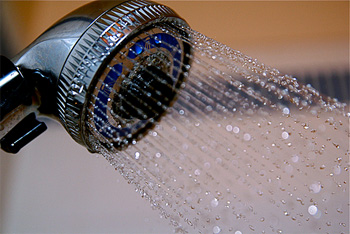Some city water systems can give residents fits, with shower walls, doors, and faucets susceptible to seal build–up. The high level of calcium and magnesium that occurs naturally in many municipal water supplies is the biggest culprit, producing hard water, which results in scale build up and water that doesn’t taste the greatest either.
If you’re looking to reduce water hardness to alleviate some of the issues that come with it; appliances often suffer from the acts of hard water, not to mention dry skin issues after showers, start by installing an ion – exchange water softener. It replaces scale – forming calcium and magnesium with sodium chloride or potassium chlolde.

Water that is softened will remove scale from faucets and appliances as well as showers. This will extend the life of your appliances.
For better tasting water, a reverse – osmosis drinking water system is a good choice. A unit will fit under the kitchen sink and can even attach to a refrigerator in some cases.
The system works by pushing water through a sediment filter first, then through a carbon filter – this is where organic material is removed along with chlorine, making water taste better.
Making use of both the ion exchange water softener and a reverse – osmosis drinking water system in your home will provide your family with the means to provide aloft water for washing, cleaning and showering, as well as great tasting water, for drinking.
Whenever you choose to purchase a system look for treatment systems certified by the water Quality Associated. Also, be sure the unit is the correct size and appropriate for your home. Considerations include water hardness, plumbing system size, and an estimate of water usage.
Many soft water systems can be installed by the average ‘weekend warrior’ by simply following the manufacturer’s instruction manual; however, some drinking water and water softening systems are complex and may require a professional plumber do the installation work.
If you decide that hiring a plumbing contractor is the best option for you, do some research before hiring the first company you come across. Ensure the company is bonded, licensed, and insured. Look at the length of time the contractor has been in business and ask if he or she will do the actual installation or if the work will be subcontracted, you’ll want to be sure the subcontractor is insured as well. Finally, ask for references or to view a portfolio it the company has one.
For information on new homes in San Antonio, Dallas, Fort Worth, and Austin, Texas, please visit with LGI Homes and ask for information on purchasing a new home with no money down.
Soften Your Home’s Water

